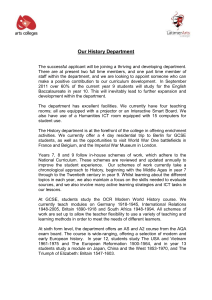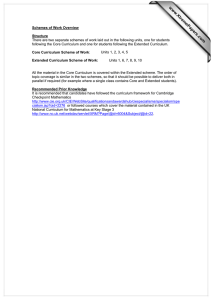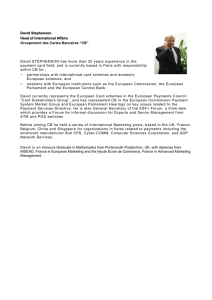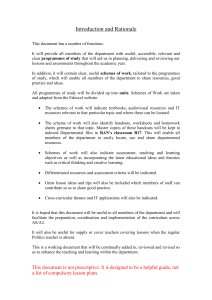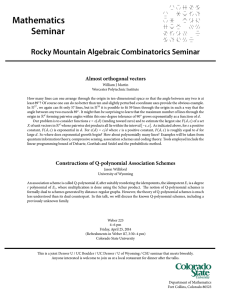British International School Scheme of Work Guidelines
advertisement
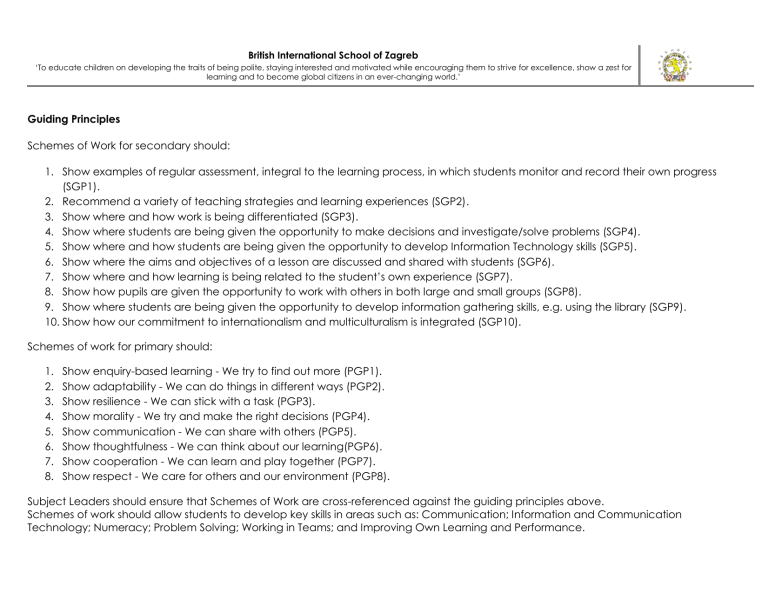
British International School of Zagreb ‘To educate children on developing the traits of being polite, staying interested and motivated while encouraging them to strive for excellence, show a zest for learning and to become global citizens in an ever-changing world.’ Guiding Principles Schemes of Work for secondary should: 1. Show examples of regular assessment, integral to the learning process, in which students monitor and record their own progress (SGP1). 2. Recommend a variety of teaching strategies and learning experiences (SGP2). 3. Show where and how work is being differentiated (SGP3). 4. Show where students are being given the opportunity to make decisions and investigate/solve problems (SGP4). 5. Show where and how students are being given the opportunity to develop Information Technology skills (SGP5). 6. Show where the aims and objectives of a lesson are discussed and shared with students (SGP6). 7. Show where and how learning is being related to the student’s own experience (SGP7). 8. Show how pupils are given the opportunity to work with others in both large and small groups (SGP8). 9. Show where students are being given the opportunity to develop information gathering skills, e.g. using the library (SGP9). 10. Show how our commitment to internationalism and multiculturalism is integrated (SGP10). Schemes of work for primary should: 1. 2. 3. 4. 5. 6. 7. 8. Show enquiry-based learning - We try to find out more (PGP1). Show adaptability - We can do things in different ways (PGP2). Show resilience - We can stick with a task (PGP3). Show morality - We try and make the right decisions (PGP4). Show communication - We can share with others (PGP5). Show thoughtfulness - We can think about our learning(PGP6). Show cooperation - We can learn and play together (PGP7). Show respect - We care for others and our environment (PGP8). Subject Leaders should ensure that Schemes of Work are cross-referenced against the guiding principles above. Schemes of work should allow students to develop key skills in areas such as: Communication; Information and Communication Technology; Numeracy; Problem Solving; Working in Teams; and Improving Own Learning and Performance. British International School of Zagreb ‘To educate children on developing the traits of being polite, staying interested and motivated while encouraging them to strive for excellence, show a zest for learning and to become global citizens in an ever-changing world.’ Termly Overview Year: Topic: Week Learning Objectives ● ● ● ● ● Read and respond to news stories Read and analyse features of newspaper stories Focus on reader interest Reading and role play Read and respond to a news story Vocabulary Subject: Term : Resources Texts: “The 10,000-mile message in a bottle” and “An alien? Fat chance” from the Daily Mail, “The postman’s spat with a black and white cat”, from the Express, “What’s up duck?” by Ann Webley, “Token that took 28 years to cash in” from the Daily Mail Software 4, Unit 3 Pupil Book 4, Unit 3, pp16–23 Homework Book 4, pp8–9 PCM 3a–b Articles from real newspapers Differentiation Flexible-pace learning Collaborative learning Progressive tasks Digital resources Verbal support Variable outcomes Ongoing assessment GP
